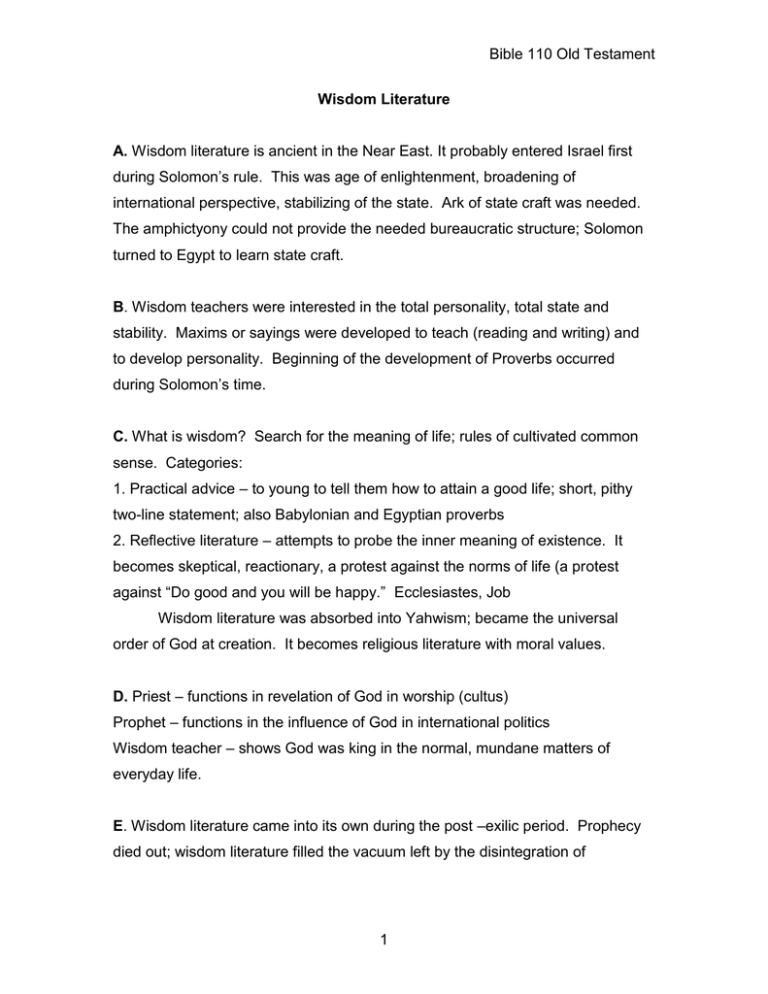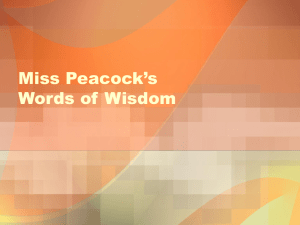Bible 110 Old Testament Wisdom Literature
advertisement

Bible 110 Old Testament Wisdom Literature A. Wisdom literature is ancient in the Near East. It probably entered Israel first during Solomon’s rule. This was age of enlightenment, broadening of international perspective, stabilizing of the state. Ark of state craft was needed. The amphictyony could not provide the needed bureaucratic structure; Solomon turned to Egypt to learn state craft. B. Wisdom teachers were interested in the total personality, total state and stability. Maxims or sayings were developed to teach (reading and writing) and to develop personality. Beginning of the development of Proverbs occurred during Solomon’s time. C. What is wisdom? Search for the meaning of life; rules of cultivated common sense. Categories: 1. Practical advice – to young to tell them how to attain a good life; short, pithy two-line statement; also Babylonian and Egyptian proverbs 2. Reflective literature – attempts to probe the inner meaning of existence. It becomes skeptical, reactionary, a protest against the norms of life (a protest against “Do good and you will be happy.” Ecclesiastes, Job Wisdom literature was absorbed into Yahwism; became the universal order of God at creation. It becomes religious literature with moral values. D. Priest – functions in revelation of God in worship (cultus) Prophet – functions in the influence of God in international politics Wisdom teacher – shows God was king in the normal, mundane matters of everyday life. E. Wisdom literature came into its own during the post –exilic period. Prophecy died out; wisdom literature filled the vacuum left by the disintegration of 1 Bible 110 Old Testament prophecy. Wisdom and apocalyptic are the ways in which God is made known after the death of prophecy. F. forms of wisdom literature 1. Basic form – 2 line maxim Simile – liken one thing to another – Prov 11:22 Comparison – compare two objects or things to help the reader discern relative values. Prov 16:17; 27:10 Exhortation or warning – warn against doing certain things because of what will happen. Prov 20:13 Statement – describes an action with no exhortation. Prov 20:4 2. Elaboration of basic form Paragraph wisdom saying – Prov 23:19 ff, 31:10 ff Personification of wisdom – wisdom becomes a person (woman) who teaches. She stands on the street corner calling after people to follow wisdom. Prov 1:20 ff Autobiography – Prov 4:1 ff; Ecclesiastes Reflections upon life (I saw . . .) Prov 7:6 ff, 24:30 ff Autobiography – wisdom teacher’s reflection (Ecclesiastes is outgrowth of wisdom literature) Ascending enumeration – Prov 30:18 ff G. Characteristics of wisdom literature Hedonistic – guide to social and political attainment Wisdom as capacity or skill Knowledge of true values of life Speculation on the moral government of the world Identification of wisdom with God – respect or fear of Yahweh is beginning of wisdom H. Basic themes or thrusts of wisdom literature Counsel or advice Prov 13:16, 15:22, 27:12 2 Bible 110 Old Testament Retribution – unethical actions will bring retribution. Prov 13:21; 26:27 Yahweh controls human destiny – impersonal providence. Prov 15:3, 19:21; 20:24 Generally statements on the cultus or Israelite worship are absent in wisdom literature except Prov 3:9; 15:8, 21:27. Wisdom teacher did not feel it their prerogative to deal with worship or cultus; not interested in history. Wisdom must be balanced by prophecy and by priesthood. Wisdom literature concentrates more on man than on God; humanistic or Yahwistic humanitarian. I. Proverbs – anthology or collection of collections. Begin compilation with Solomon, final compilation ca 180 BC 5th Collection (chs 25-29) “Men of Hezekiah” 8th century 6th – 7th Collections –Edomite, non-Israelite J. Job – Prose prologue and epilogue; 3 cycles of speeches; Job’s friends are foils for him (Eliphaz, Bildad, Zophar). Elihu is a fourth character. Integrity of the book is challenged at 4 points: 1. Prose prologue and epilogue – consensus that these are not original to the book; part of oral transmission 2. Description of third cycle of speeches (Ch 22-28). Job speaks as his friends would speak. Eliphaz speaks briefly; Bildad and Zophar not at all. 3. Speeches of Elihu (Ch 32-37) These added later, disrupt the cycle and add nothing. Some say that they refute the whole book of Job. 4. Speeches of Yahweh (Ch 38-41). Some say that they are not original but without Yahweh, Job does not have meaning. Job does not answer the problem of suffering. It shows one who has been righteous and now suffers and questions the moral government of the universe. At the end of Job God gives Job a hearing, but God speaks first; Job then has nothing to say. God speaks and tells Job to gird up his loins like a man. Job realizes that he sinned: the attempt to make God act like a man. So Job 3 Bible 110 Old Testament condemns himself in presuming to think that he knows more about running the world than God (Adam’s sin). In the end, nothing is solved. Job finally can live in the world with all its contradictions. He was restored and lived again. Man never encounters God when he feels himself sufficient to explain God; when he feels sufficient to explain God, he becomes a sinner. K. Ecclesiastes – attributed to Solomon in 3rd century BC compilation. It is a unity. Not a skeptical, secular book but it is a deeply religious attempt to understand the world in which we live. God exists; where do you find him? Theme: God exists, and man can know only one thing about him – he has implanted the goal (desire) of happiness in every man. Ecc 3:10. Man cannot understand the world, and this is the vanity – trying to discover the wisdom. Ch. 2 – autobiographical Ch 3-6 – contradictions of the world Ch 7 – doctrine of moderation (esp 7:15 ff). Ecclesiastes is a positive book, arguing that man is to live a manly life in a world of contradictions. One does not try to explain the contradiction. Life has meaning in the living of it. Ecclesiastes answers nothing but enables one to deal with life. Good and evil are part of the fabric of life. 4


